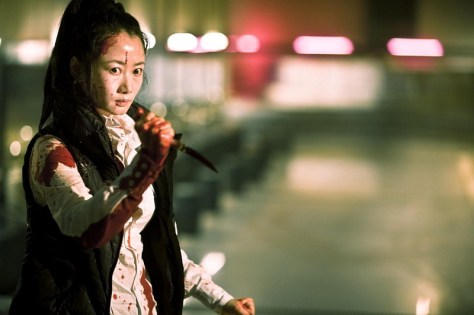
Format: Cinema
Release date: 15 August 2014
Distributor: Studiocanal
Director: Ari Folman
Writer: Ari Folman
Based on the novel: The Futurological Congress by Stanislav Lem
Cast: Robin Wright, Harvey Keitel, Paul Giamatti, Danny Huston
Israel, Germany, Poland, France 2013
120 mins
In 2008, Ari Folman astounded audiences with Waltz with Bashir, in which he used a mix of animation and live action to tell a devastating account of his experience as a soldier during the 1980s Israel-Lebanon war. Six years later, he returns with a remarkably ambitious, intelligent science-fiction film loosely based on Stanislaw Lem’s The Futurological Congress. Richly resonant, multilayered and beautifully psychedelic, The Congress again combines live action and animation to tell the story of Robin (Robin Wright), an ageing actress forced to sell her scanned image to her studio Miramount for them to use as they please. Twenty years later, she attends a congress on the future of cinema, which takes place in a zone of chemically-induced animated hallucinations. But following a violent intervention by rebels, Robin finds herself propelled into a strange future world that is even less real.
Virginie Sélavy talked to Ari Folman about transposing Stanislaw Lem’s novel to our world, the merits of escaping from reality, and why The Congress is a documentary.
Virginie Sélavy: Waltz with Bashir was a very personal film, while The Congress is a much larger-scale speculative reflection on our world. Was adapting a novel a way of getting out of the realm of your own personal experience?
Ari Folman: Making Waltz with Bashir was very tough, travelling with the film afterwards was very tough, so I needed an escape route from Bashir, from myself, from history, from war, from everything you can imagine. And I thought The Congress was a good one because it’s a novel I read when I was very young and I loved it. I’m a sci-fi buff.
Stanislaw Lem’s idea of a world that is made of grimmer and grimmer layers of reality disguised by illusory appearances feels fairly prescient. Was that one of the reasons why you wanted to adapt it?
Yes, it was. In many aspects I think that The Congress is a documentary. I only make documentaries – and sci-fi. The Congress is documentary sci-fi. When I wrote the script I had no clue that they’d been scanning actors in LA for a long time now. In the film it’s supposed to be an X-ray-machine room, and when I arrived in LA I read for the first time about the scanning facilities that they have over there. Technology has changed tremendously, in cinema you now have CGI, motion capture, scanned actors and everything. They can make movies with no actors. It doesn’t mean that they’re going to do it, but it could be done. So that’s the first part of the movie. The second part is more inspired by Lem’s novel, it’s about identity, human identity. So yes, I’d say it reflects our lives in many ways.
That’s one of the major changes you’ve made to the book: space traveller Ijon Tichy, the main character in the book, becomes an ageing actress, and you shift the action from the world of science to the world of cinema.
When I optioned the book I didn’t know what I was going to do. Then in Cannes I met this ageing American actress, very famous, from the 60s-70s, and I didn’t recognize her at all. I had this vision, it was going to be her, a goddess from 45 years ago who now is a nobody. That was the starting point for the script. I went backwards in time, thinking about identity. I didn’t live in Poland in the late 60s communist era when Lem wrote his novel, so I had to make this translation to things that I’m really into. That’s how I ended up talking about cinema and the future of cinema, which is represented by an ageing actress in our world.
That adds another layer to the novel’s blurring of fiction and reality, because of course cinema is also about reality and its representation.
Not all cinema – I don’t think that it is what cinema always does. But in general, for me, good cinema is taking this real time that we live in, which is the time that our subconscious lives in, and trying to make it one piece of time that you work into a movie. It’s what I try to do, this combination really attracts me.
Was Robin Wright the actress you wanted from the start?
No, it was meant to be Cate Blanchett, and I wrote the treatment for her. But then I met Robin Wright by chance in LA, and the moment I saw her I knew that it could only be her.
That adds even another layer, as she plays ‘Robin Wright’ in the film. How involved was she in the project?
She was very much involved from the very beginning. I researched her and I pitched the project to her, then she joined me and we worked on the character together, and I went home and wrote the script. She was involved in many aspects, from the writing until the end of editing. She was a great partner, very intelligent woman, very sharp. She really was the best partner that I could have.
As in Waltz with Bashir you use a mix of live action and animation, but with different implications: here it is perfectly suited to the exploration of the real and the unreal. Do you see this mix of filmic forms as essential to your work?
After Waltz with Bashir I decided I wanted to explore, I wanted to make something that mixed the two, live action and animation, no matter what I was going to do, I wanted to try, for the sake of the experiment. With The Congress, and with Waltz with Bashir as well, we decided to start with documentary rather than fiction, and fiction rather than sci-fi, because otherwise it can be a bit conventional. I try to explore new things, and here the biggest challenge was writing and directing a movie where you go from a first, straight hour with a lovely actress and a story, and then in the second hour she breaks the conventions and she becomes animated, and that was a big challenge for me as the director to make it happen.
Live action in your films is always about a terrible reality, and animation is a way of escaping, or dealing with, the full horror of that reality. Is that fair to say?
I hadn’t thought of that but that’s an interesting idea. . I think that maybe live action is there for bad issues and actions.. It happened with Waltz with Bashir, and here again I make the most of the beautiful creatures of the animated world, because we are exposed to a very tough and harsh world, and it can probably be shown only in animation. I think animation gives you many more layers as a director – I’m talking about animation for adults, which is a rare thing, unfortunately.
At the end, there is no easy answer as to what is best, whether living in the real world or hallucinating a more beautiful world. Was that openness essential to you?
Yes, absolutely. With my films, it’s a matter of interpretation, you have to decide what you think with what you are, with your conscience, your psychology. It’s not my duty to guide you towards a decision as to what is best. It’s a conscience that we experience in the Western world every day of our lives, because the world of hallucinations is a metaphor for a lot of things: it could be money, it could be addiction to sex, it could be addiction to many things, it doesn’t have to be just drugs. In the book, of course, Lem goes for drugs, and it looks very cinematic and psychedelic, but everyone has to find an escape route, which can be very addictive and has nothing to do with real life. And it’s your own decision to know what’s best.
Some elements in the film suggest that what we see from the moment it becomes an animation could be the product of Aaron’s (Robin’s son) mind. Is that a possibility that you wanted to put in the audience’s heads?
I’ve heard this interpretation. It was not one of my intentions, but I really like to hear other people’s interpretations of the film. When I walked out of the premiere in Cannes, my sister came to me and she was very pissed off. She loved the movie and she couldn’t understand what happens to Aaron at the end. She said, ‘it’s a shame, you shouldn’t have done that’. I tried to explain to her that it’s not like that. I told her, ‘I wrote the script, I know what I wrote’, but afterwards I gave up and I liked that interpretation. I thought, OK, this is what she saw in the movie and she has her own specific reading, and that’s fine.
Would you make the same choice as Robin at the end?
Me? Definitely.
Interview by Virginie Sélavy
Watch a clip from The Congress:







